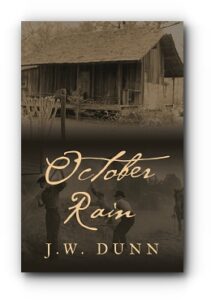Reviews of J.W. Dunn’s October Rain

Reviewed in the United States on May 4, 2024
OCTOBER RAIN KIRKUS REVIEW
J.W. Dunn
Booklocker.com (224 pp.) $17.99 paperback, $2.99 e-book ISBN: 9781958891025
October 15, 2023
The patriarch of a Louisiana family must contend with his son’s restlessness, tending to his farm, and an injury on the job in Dunn’s historical novel.
Thurston Knox and his wife, Retty, have a bustling family on an 80-acre farm in 1906 Louisiana. Most of his children are too young to work the farm, and his second-eldest son, Luke, expresses his intention to leave and find work elsewhere. When Luke departs, Thurston is left to deal with his family’s needs and work the land—overextending himself results in a plow accident. Meanwhile, Luke embarks on a journey of self-discovery that leads him to his uncle (who is only four years his elder), Matt Tarroll, and his wife, Tillie. He is welcomed with open arms, but when Luke starts to develop feelings for Tillie, it’s only a matter of time before all hell breaks loose. Adding to the misery of an illicit affair and a fractured father-son relationship is the threat of disease, which takes hold of the family matriarch, Retty, and doesn’t let go. This is a slow, carefully paced historical drama set in the spring and fall of one momentous year. The author crafts rich regional and period dialogue to strongly evoke a bygone, deeply religious environment (“I need to head on back home before Martha sets in to worrying”). As attentive as Dunn is to the sound and texture of the early 20th-century Louisiana parish, however, the characters never really feel satisfyingly developed (particularly the stoic lead, Thurston). Luke is someone who reacts—the reader doesn’t really know why he wants to run away, or what motivates him throughout the story. There’s a lot of fine work in the descriptive language and in the creation of a fully-realized setting, but the characters at the fore never quite spring to life. A brilliantly crafted diorama of early 20th-century Southern life lacking strong characters.
